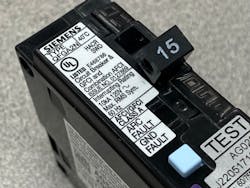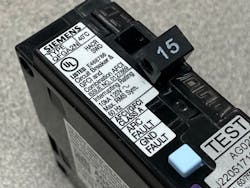One thing I’ve learned since becoming an electrical instructor more than 20 years ago is that the Code language does not always say what we think it says. I regularly find myself being humbled by Code wording that I have read thousands of times — and that I thought I fully understood — only to read it one more time before noticing that something just doesn’t jive.
Case in point: The AFCI protection requirements in Sec. 210.12 were introduced into the Code beginning in 1999. I’ve been teaching and discussing those requirements for more than 23 years, but I recently realized it does not say what I thought it said. Based on the literal wording, we’ve probably all been installing AFCI protection on circuits that were not required to have it.
Article 100 provides several different definitions for voltage including “voltage, nominal” and “voltage, of a circuit”. But is the “120V” specified in Sec. 210.12(A)-(D) a “nominal voltage” or the “circuit voltage”? The word “nominal” is never used in any of the AFCI protection requirements of Sec. 210.12, and Sec. 110.4 tells us that the “voltage considered shall be that at which the circuit operates.” So, when we put all these Code pieces together, it appears that AFCI protection is not required for any branch circuit operating at a circuit voltage other than 120V. It does not require AFCI protection for branch circuits operating at 115V, 118V, 122V, or any voltage other than 120V. Several other rules in Art. 210 specify “nominal voltage” rather than “voltage of a circuit,” including Secs. 210.1, 210.5(C)(1), 210.6(A)-(D), and both exceptions to Sec. 210.9.
I certainly don’t think the intent of Sec. 210.12 is to exclude AFCI protection for branch circuits operating at 115V, 118V, or 122V. I believe the intent is to apply the AFCI protection requirements to “120V, nominal” branch circuits. Similar voltage conundrums exist in other Sections of Art. 210, too, including Secs. 210.11(C)(3) and (4), 210.13, 210.19, and 210.20. Are the voltages specified in each of these requirements “nominal voltages” or the “voltage of the circuit”? I’ve submitted several Public Inputs for the 2026 Code cycle to help improve the usability of some of these rules. Until some clarifications are made to the Code language, I suggest discussing this with your AHJ to try and figure out exactly what the Code language is trying to say.
About the Author

Russ LeBlanc
Owner
Russ started in the electrical trade as an apprentice in 1985. He worked his way up to become a Journeyman Electrician and then eventually became a Master Electrician and Licensed Construction Supervisor. In 1999 Russ become an Electrical Instructor for The Peterson School of Engineering in Massachusetts where he developed his passion for teaching, and quickly became Department Head of Electrical Instruction. Russ has taught thousands of apprentices, electricians, engineers, inspectors, and other electrical professionals during his career as an instructor. He continues to provide electrical professionals with Electrical Code seminars, Arc-Flash Awareness training seminars and educational material through his LeBlanc Consulting Services in North Reading, MA whose specialty is educating electricians. He has been an active member of the NFPA Electrical Section and has authored hundreds of National Electrical Code proposals and comments which have become Code rules to improve the safety for the electrical industry. Russ is also an IAEI certified Electrical Inspector.
Please visit www.russleblanc.net for more information.

